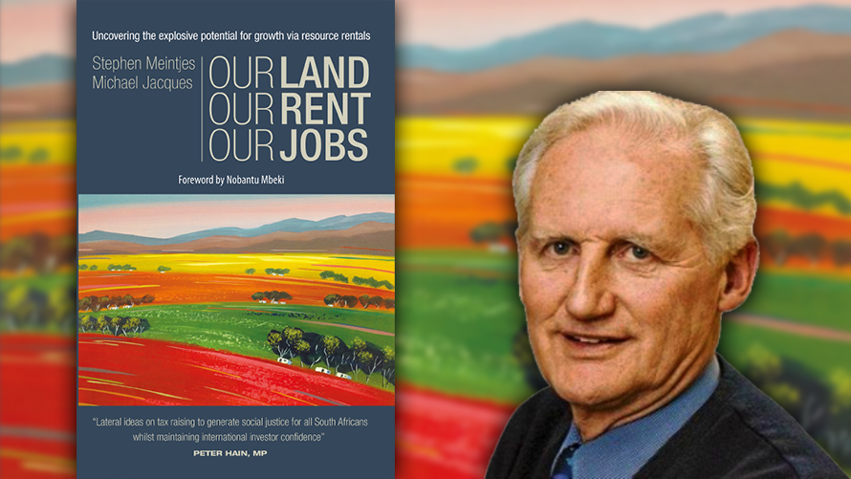This presentation suggests that South Africa’s new government, despite initially considering radical land expropriation, will prioritise getting already-expropriated land into use, tackling urgent issues like unemployment, collapsing local government, and inadequate services. The author argues that the urban influx isn’t driven by the general economy but by taxation policies, specifically highlighting the impact of fuel taxes on rural areas and the negative consequences of abolishing Site Value Rating (SVR). The central proposal for fixing this is reinstating SVR in urban areas and implementing a land rent system in rural areas to incentivise productive land use, stimulate development, and ultimately allow for reductions in other taxes.
Click this link to view the entire presentation by Stephen Meintjes
https://drive.google.com/file/d/1vJix-FMppcW8sjLjV-V074suWqTyxFe_/view?usp=sharing
Kindly contact Mr Stephen Meintjes on stephenmeintjes@gmail.com for a robust and developmental engagement session.
Below is a summary with briefing notes
Subject: Land Reform, Urban Planning, Taxation, and Economic Strategy in South Africa
Executive Summary:
This document outlines key themes and proposals regarding land reform, urban development, and economic strategy in South Africa, as presented in the provided source. A central theme is the critique of the current tax system, particularly property rates, as a driver of urban influx and land underutilisation. The document highlights the GNU’s current focus on establishing emerging farmers on already expropriated land, shifting away from immediate Expropriation Without Compensation (EWC). A radical proposal is the reinstatement of Site Value Rating (SVR) in urban areas and the implementation of a minimal land rent in rural areas as a primary tool to address land issues, stimulate economic activity, and ultimately reduce other taxes. The source also touches upon the underutilized potential of urban land and the need to reinvigorate the mining and agricultural sectors through revised tax and land policies.
Key Themes and Ideas:
- Shift in Land Reform Focus:
- The newly appointed Minister of Land Reform and Rural Development, Mzwanele Nyhontso, initially indicated a move towards EWC.
- However, “for now, in line with broad ANC, DA and IFP strategy, he will focus on, at long last, properly establishing emerging farmers on c. 4m hectares of already expropriated land.” This suggests a more pragmatic, immediate approach within the Government of National Unity (GNU).
- Urgent Crises Beyond EWC:
- The GNU faces a wide range of pressing issues that extend beyond the “narrow focus of agreed private sector assistance in crime and corruption, energy and logistics.”
- These include “unemployment, local government collapse, water, abysmal schools, massive budgetary constraints, dysfunctional SOE’s, etc.” This context explains the prioritization of existing land over immediate EWC.
- Urban Land Influx and Underutilisation:
- The source argues that the “endless urban influx” is not solely driven by the economy, but significantly by “TAXES STUPID! YES, THERE ARE FOREIGNERS TOO.”
- It highlights the stark contrast between overcrowded townships located far from job opportunities (e.g., Langa, Soweto Kliptown, Duncan Village) and valuable, “idle” land in affluent urban areas (e.g., Sandton, Rosebank, Illovo, Parkwood, Melrose). Examples provided include:
- A c. 3.6 hectare site in Sandton on a busy road, “likely for shops, offices, dwelling units.”
- A site “nestling next to Rosebank Mall,” described as “Ideal for more dwelling units.”
- A c.4000m² stand in Parkwood, “Planning permission likely for, say, 9 dwelling units.”
- A site on Glenhove Road, Melrose, “bereft of its erstwhile manor, has lain empty for decades.”
- This juxtaposition emphasizes the inefficient allocation and use of urban land.
- Critique of the Municipal Property Rates Act 2004 and Site Value Rating (SVR):
- The source strongly criticizes the “Municipal Property Rates Act 2004” for having “Abolished Site Value Rating.”
- It claims this was done “Despite warnings as to what would happen,” implying that this change contributed to the current urban land issues.
- Proposed Solution: Reinstate Site Value Rating (SVR) and Land Rent:
- The central proposed solution is to “Reinstate SVR! ASAP” in all urban areas.
- For rural areas, the proposal is to “Implement minimal, tax- deductible, land rent.”
- The rationale is that SVR, based on the value of the land itself rather than improvements, incentivises development and prevents land hoarding.
- Implementation Phases for SVR:
- Phase 1: Municipalities must “replace Composite CR with SVR,” with “supervision by National Treasury.” The aim is for SVR to “provided for the needs of the municipalities.”
- Phase 2: National Treasury should “commence, in year 3, a gradual move, from reliance wholly on taxation, to increasing reliance on SVR.” This would begin with regressive taxes like “transport fuel in year 3 and VAT in year 4.” The proposal emphasizes that this should not be an “extra tax gimmick” and “the overall revenue from tax plus SVR remains the same through time.”
- Phase 3: By “year 4, increased revenue from SVR will facilitate easing the threshold for income tax on individuals and companies.”
- Economic Benefits of SVR:
- Implementing SVR is expected to stimulate “Economic growth” through a “180-degree turnaround in landowner incentives!”
- Cities would be “energised-it’s ‘buy, implode and build’ again!” Landowners would no longer be incentivised to “hoard land” or engage in “black jack farming,” but rather to “Implode and rebuild….OR Buy and maintain in economic use until ripe for redevelopment.”
- This would lead to “Urban land becomes more freely available,” “Higher site value rates (SVR) incentivise early development,” and a “Construction impulse stimulates economic activity.”
- Impact on Rural Areas:
- The tax system “hammers the rural economy,” with “The further from metros the harder petrol taxes hit.”
- The switch from apartheid-era tax breaks to full VAT “eliminated thousands of factory jobs.”
- “Tax revenue from rural areas isn’t ploughed back into their infrastructure.”
- The implementation of a “minimal, tax- deductible, land rent” is proposed to address rural land use.
- Other proposals for rural areas include clarifying “communal tenure decision making responsibilities” and commencing the “reduction of fuel taxes.”
- Potential in Agriculture and Mining:
- Despite challenges, South Africa has “great prospects for agriculture” and “still enormous mining potential.”
- Implementing SVR in urban areas and land rent in rural areas is expected to lead to “Immediate increase in development of under-utilised land” in agriculture, resulting in a “Net increase in agricultural production” and “Increase in employment and mentorship opportunities.”
- For mining, implementing a “progressive tax formula for gold mines” across the industry is proposed to address “deep cyclicality,” reduce risk for new ventures, and, combined with lower payroll and other taxes, “lower the required level for paygrades,” thereby reducing illegal mining.
- Land Use Breakdown:
- The source includes CIA World Factbook data from 2018 highlighting South Africa’s land use:
- Agricultural land: 79.4% (arable land: 9.9%, permanent crops: 0.3%, permanent pasture: 69.2%)
- Forest: 7.6%
- Other: 13%
- This data provides context for the large proportion of land dedicated to agriculture and pasture, while the main focus of the reform proposals appears to be on addressing issues in urban and peri-urban areas and their connection to rural migration.
- The Land Situation as Both Exciting and Threatening:
- The source concludes by stating that the land situation is “both… Exciting and… threatening.”
- It points out that “the bulk of our people do not have anything like reasonable access to land.”
- It also notes that “Our land use incentives are skewed” and there is “Unnecessary politicisation” of the issue.
Most Important Ideas/Facts:
- The GNU’s current focus on settling emerging farmers on existing land, rather than immediate EWC.
- The argument that the current tax system, particularly property rates, significantly contributes to urban migration and land underutilisation.
- The proposal to reinstate Site Value Rating (SVR) in urban areas and implement land rent in rural areas as a fundamental shift in land and tax policy.
- The phased approach for implementing SVR, aiming to gradually replace other taxes and stimulate economic growth.
- The identification of significant underutilized land in affluent urban areas despite the housing needs of those in peripheral townships.
- The potential for revitalizing agriculture and mining through revised tax and land policies.
Conclusion:
The provided source presents a strong argument for a fundamental change in South Africa’s land and tax policies, moving away from the current system towards a reliance on Site Value Rating and land rent. It positions this shift not only as a solution to land inequality and urban underutilisation but also as a catalyst for broader economic growth and a means to reduce other, more regressive, taxes. The document highlights the urgency of addressing land issues within the broader context of South Africa’s multiple social and economic crises.







